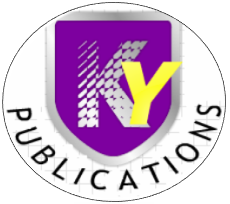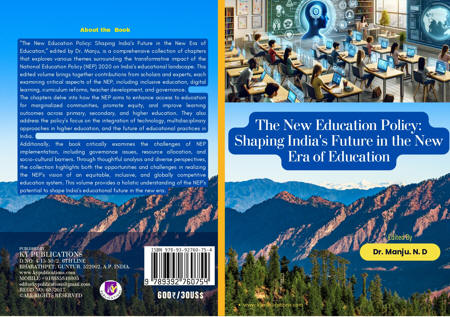KY PUBLICATIONS
A HOUSE OF BOOKS/JOURNAL PUBLICATIONS
www.kypublications.com
[Regd agency Under “GOVERNMENT OF INDIA, MINISTRY OF HUMAN RESOURCE
DEVELOPMENT, DEPARTMENT OF HIGHER EDUCATION” for International
Standard Book Number (ISBN)
[UGC APPROVED]
Dear Sir/Madam
Greetings
I hope this letter finds
you well!
Books under
NEP 2020 play a
crucial role in reshaping India’s education system by promoting
multidisciplinary learning,
skill development, and inclusivity. They align with the
policy’s vision of holistic
education, integrating
critical thinking,
creativity, and technology. These books emphasize
regional languages,
vocational training, and research-based learning, preparing
students for 21st-century
challenges. By incorporating
Indian knowledge systems
and global best practices,
they foster innovation and
employability. Such books help educators and learners
adapt to competency-based
education, ensuring
equitable access and
lifelong learning
opportunities in alignment with
India’s evolving
socio-economic landscape.
Proposed Edited Book Title:
The New Education Policy: Shaping India's Future in the New Era of Education
ISBN: 978-93-92760-75-4(Print)
*Book Published Click here to access the contents
Contact:
editorkypublications@gmail.com/ via
WhatsApp: 8885848005
Themes of the Proposed Book,
but not limited to
- The Impact of NEP 2020 on Primary
and Secondary Education: Analyzing how the policy is reshaping
India's education system with a focus on foundational literacy,
numeracy, and overall student development.
-
- Higher Education Reforms: A
critical examination of the NEP's vision for transforming higher
education, emphasizing multidisciplinary approaches, research
funding, and global engagement.
-
- Inclusive Education: Exploring
the NEP’s strategies for enhancing access, equity, and
opportunities for marginalized groups, including girls, rural
communities, and students with disabilities.
-
- Technology and Digital Learning
in NEP: Assessing the role of digital education and EdTech
integration in realizing the NEP’s vision for the future of
learning.
-
- Teacher Training and Professional
Development: Investigating how the NEP addresses teacher
education, continuous professional development, and the overall
enhancement of teaching quality.
-
- Curriculum and Pedagogical
Innovations: Analyzing the NEP’s focus on holistic,
learner-centered education and the transition to
competency-based learning approaches.
-
- Governance and Accountability in
NEP Implementation: Evaluating the effectiveness of governance
structures and administrative mechanisms in achieving the NEP’s
goals.
-
- The Intersection of Policy and
Social Change: Examining how the NEP aligns with broader social
objectives such as gender equality, social justice, and economic
development.
-
- Challenges in NEP Implementation:
Identifying the barriers to successful implementation of the NEP
and proposing solutions to overcome these challenges.
-
- Analysis of Recent Policy
Reforms: A deeper look at the NEP 2020 and its implications for
schools, higher education, and vocational training, with a focus
on policy shifts.
-
- Policy and Technological
Integration: Exploring how digital learning and EdTech solutions
are influencing future educational policy directions.
-
- Inclusive Education Policies:
Addressing the design and impact of policies aimed at ensuring
education for marginalized and underserved communities.
-
- Governance and Educational
Administration: Analyzing the role of governance structures at
both the state and national levels in the implementation of
educational policies.
-
- Equity and Access in Education:
Evaluating policies aimed at reducing educational disparities
and improving access to high-quality education across India.
-
- Curriculum Reform and Pedagogical
Innovations: Investigating how educational policies are shaping
curriculum development and pedagogical practices in schools and
universities.
-
- Private vs. Public Sector in
Education Policy: Analyzing the roles of private institutions
and their interaction with public education policies in shaping
India’s educational landscape.
-
- Sustainability and Policy
Integration: Discussing the importance of integrating
sustainability, climate change, and social justice into
educational policy frameworks.
-
- The Future of Teacher Training
and Professional Development: Exploring how policies are shaping
the future development of educators to align with evolving
educational needs and goals.
· Submission Guidelines (Click here for More details)
·
The
papers must be genuinely ORIGINAL. Wherever they quote other
authors, the citation is a must.
·
Papers need to be
restricted to less than 10 pages.
·
A 4 size, 12 pt size,
MS Word, Times New Roman font 1.5 line space.
·
Authors need to submit
their papers in the following manner
§
Title of the paper
§
Author/Authors name,
designation, institution, e-mail, mobile no.
§
Abstract (Not more
than 200 words)
§
Keywords
§
Introduction.
§
Body of the paper
§
Conclusion
§
References/Bibliography
Please submit your article
to our email (editorkypublications@gmail.com)
as an attachment in a Microsoft Word document along with Book title
Editorials: Dr Manju.N D
BOOK FORMAT: Paper Back (B5 SIZE)







